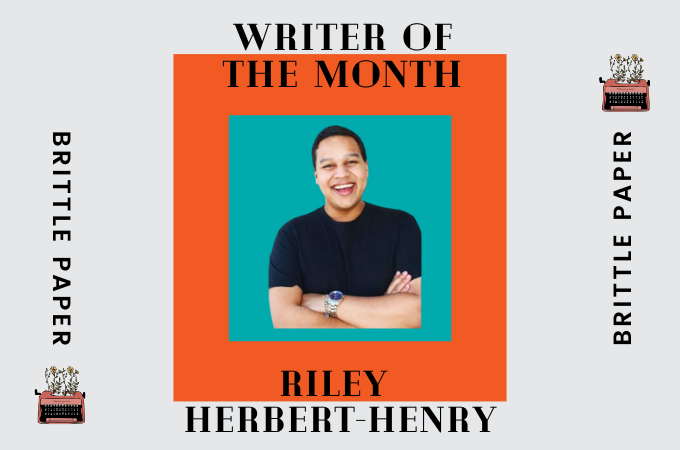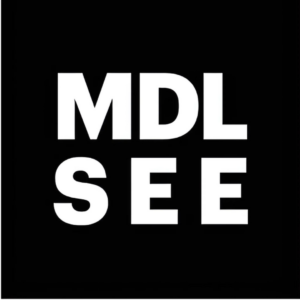
Brittle Paper’s Writer of the Month for March is Riley Herbert-Henry!
Riley Herbert-Henry is a fiction writer based in Cape Town, South Africa. His writing explores the complexities of human relationships, grief, and love, delving into the heart of the human condition. You wouldn’t believe it when you read his work but his Brittle Paper story, “White Space,” was his debut short story, marking a promising start to his writing career.
Riley’s work is characterized by an intimate exploration of emotions, offering readers a glimpse into the vulnerabilities that shape our lives. He draws inspiration from his personal experiences, as well as his travels, which deepen his understanding of different cultures, people, and perspectives. His writing is driven by a desire to better understand the human experience and the intricate ways in which people connect with one another.
When he’s not writing, Riley enjoys spending time with his husband and their rescue pup, Leo, exploring new places, and reflecting on the intersections of life and art. With a deep commitment to storytelling, Riley Herbert-Henry continues to grow as a writer, shaping his unique voice in contemporary fiction.
Please join me for a lovely chat with the talented Riley!
***
Brittle Paper
Riley, congratulations on being our March Writer of the Month! Your story, “White Space,” was such a fantastic piece and my highlight of the past month. We’ll chat more about the story but for now, let’s first talk about who Riley Herbert-Henry is and how you became a writer?
Riley Herbert-Henry
Thank you! It’s a great honour to be recognised by Brittle Paper. It’s a publication that has always meant a lot to me.
Like most writers, I started young. I scribbled stories and character sketches when I was meant to be focusing in class. I was also really involved in my school’s drama society and would write pieces that we would then perform. I was raised with stories and books. I remember my mother used to make up stories for my sister and I before bed and it was some of the most joyful memories of my childhood – she had this recurring character, ‘The Bubble Bath Fairy’ and while I may not write for children, I think of that Fairy often! [laughs]
Brittle Paper
That’s such a wholesome childhood memory!
Now, in keeping with the WotM tradition, you need to answer three questions to help us get to know your literary personality a bit more.
First up, what is the earliest book you remember reading and feeling like it actually represented a part of you?
Riley Herbert-Henry
Apart from the typical Kathy and Mark and Biff and Chip books of everyone’s childhood, the first book that truly resonated with me was James and the Giant Peach by Roald Dahl. It was a story of perseverance and freedom and how hard work gets you to where you need to be. I was always ‘different’ as a kid and, at times, felt like a true outsider. This book helped me see that even though we may be alone, it doesn’t mean that we are necessarily lonely. That sometimes, the most precious moments can be found if you just look within.
Brittle Paper
That’s really beautiful, Riley. I used to read a lot of Roald Dahl and Enid Blyton books when I was a kid, and I loved them because they were fun to read and the illustrations were always great! But looking back, those books were filled with characters who carved out spaces for themselves among the mundane and conventions of society and filled it with their own weird wonders. I love that so many adults have childhoods filled with those books.
Is there a book you have read that you feel should be taught in schools?
Riley Herbert-Henry
I love this question because there are so many ways I could answer it! I’ll start with An Island by Karen Jennings. The minute I started this book, I could not put it down. It is a story about home and belonging, about what belongs to us and the lengths we would go to in order to protect it.
I also think that God’s Pocket by Sven Axelrad would make good pedagogy. Sven writes with an empathy and understanding for his young characters that we really need to be seeing more of in literature. He explores teenage friendships and the extremes that young minds go to while trying to make sense of the world around them.
I also wanted to mention a book I was taught in high school – Buckingham Palace by Richard Rive – set in the heart of District Six – it has such wonderfully bizarre characters while tackling direly important social issues and I feel that it should be taught more widely.
I could go on forever about this – but these 3 novels would be on the top of my list.
Brittle Paper
Buckingham Palace is a great recommendation! When I was in school, I was still very much inexperienced with books that had BIPOC characters, one of those things that take you a while to realise until you’re properly exposed to it. But I’ve had some great English teachers from primary and high school who would sneak in South African books that were centred on characters and communities of colour. Reading Who Killed Jimmy Valentine? or 111 Colleen Court was eye-opening.
Last of three, if you could have a dinner party with your favourite artists, who would they be?
Riley Herbert-Henry
I would have loved to have dinner with Athol Fugard, the playwright, who just passed away recently. His plays weren’t just stories, they were acts of activism, and I think we have so much to learn from them. Similarly, I would adore to meet with Antjie Krog, the poet. I resonate with her work so deeply.
I think that the intersection between writing and music is a beautiful one, and find that the poetry in lyrics is so powerful – one such example is Ella Fitzgerald. I mention her in the story while Felicity dances with her father at her wedding. I was listening to “In A Sentimental Mood” when I was writing it, and the lyrics:
I can see the stars come through my room
While your loving attitude
Is like a flame that lights the gloom
really helped me shape the closing of the story.
Those would be my dream dinner party guests – my kitchen is only small.
Brittle Paper
I would love to be invited, partly to hear Ella sing, but mainly because Fugard would have had some brilliant dinner party stories. And on the note of impactful storytellers…
Riley, you are our WotM because of your piece, “White Space,” and even though I truly love this piece, I feel like I have so much to say about it that I’m struggling to think of coherent questions. So, while I gather my words, let’s start with the age-old opener of, what inspired you to write this story?
Riley Herbert-Henry
I really appreciate you saying how much you love the piece; it means a lot to me. This story is very personal. It is loosely based on the story of my own grandparents who are also called Felicity and Ralph. They both passed away within 6 months of each other last year, and this story came shortly after my grandmother, Felicity’s, funeral. It was my way of honouring them and creating space for their story to be shared. I get emotional every time I think of them.
For years, they were oppressed and had to fight “twice as hard for half as much” (I can’t remember who used that phrase first, but it sums their situation up perfectly). Their love was like a homing beacon that kept drawing them back to one another – which is to say that it was the only consistent thing they had. If I end up half as happy in my marriage as my grandparents were in theirs, I would be thrilled. I miss them every day, and I am happy to have written this story for them.
I have received numerous questions and comments after this story was published. My favourite was a comment from a reader saying, ‘Ralph better take care of our girl Felicity,’ and I want to assure everyone that he did just that and so much more.
Brittle Paper
I had no idea it was based on your grandparents, and I’m so deeply sorry for your loss. This is a beautiful tribute, and it’s really heartwarming to know that the real Felicity and Ralph had an even sweeter love story.
When I publish a piece, I usually read it at least thrice. Once when I review the submission, once/twice when I edit it, and again before I finalise it for publication. Every single time I read this story, I tear up when Felicity’s dad gives Ralph that speech in the kitchen. There’s a part of the speech that sums up the story quite well:
You two can do what you need to do, but I have one condition. Ralph, in a world designed against us, where the colour of your skin determines the level of respect you receive, I need you to promise me that your only priority will be to protect my daughter and make sure that no one and nothing can come to harm her
When we were emailing during the editing process, I mentioned that one of the reasons I love this story is because it reminds me of the District 6 plays. My parents always took us to watch them growing up, and I still have a copy of the collection. You didn’t have to be a part of the community to appreciate those plays, but they still mean a lot to many who are. Your story is brilliant in its own right, but I love it even more because it reminds me of the plays. I feel like “Paradise Road” should have been playing in the distance at the end of the story [laughs].
Riley Herbert-Henry
If there is ever a screenplay of “White Space,” best believe I’m adding “Paradise Road” at the end – I think that’s brilliant! [laughs]
The speech in the kitchen was one of the more difficult scenes to write. I found myself stopping and starting because of how emotional it made me. It’s a speech that so many people had to have and, while it was unfair that they had to do it, it was a sign of the strength and resilience of our elders. I had to include it.
I adore those plays. One of my earliest memories is seeing the 2003 version of District Six by Kramer/Petersen at the Baxter Theatre. I would have been about 6 or 7, and I was obsessed. Not only with the music and the bright costumes and set design, but with the story. My parents bought me the DVD and I watched it on repeat so many times that it eventually stopped working! My parents would ask me to do my best impressions of those characters for guests who would come around our house, and ever the entertainer, I would say the words and sing the songs. It was my own form of storytelling before I was able to write them down. It is one of my greatest influences, and I appreciate that reading the story brought up those memories for you too – they were certainly with me when I was writing this piece.
Brittle Paper
The Kramer/Petersen version was the absolute best! We would scan those Baxter booklets every year to see when they would bring it back.
You’re so right about the kitchen speech, though. I can’t fathom how so many parents found the strength to do that. I messaged you on Instagram the night the story was published. It was during Ramadaan, and I told you that my parents and I had broken our fast and we were still sitting at the table when my mom started reading “White Space.” She loved the story and she thought you captured it so beautifully. It reminded her of so many stories of the people she knew growing up, of families that were separated, of friends she had that were moved and never heard of again. It makes my heart happy that there are still writers like you, the kind that can make a story feel like an old family album of laughter and tears.
But I don’t mean to typecast you! I’m only familiar with the story you shared with us, so I am curious about the other themes or topics you like writing about. Or are you one of those writers who doesn’t have a specific genre and instead lets the muses drag him across everything?
Riley Herbert-Henry
This really touched my heart, please thank your mom for her kindness. I think what you’ve said here captures the importance of stories like these. I wanted to write something that felt like snapshots of a life, where, although we only see the story from Felicity’s perspective, we get to see the other people in her orbit too and learn about them. One of my favourite scenes is when Felicity’s mother takes out the photo album on the morning of the wedding. Seeing you make that analogy means a lot.
I tend to write quite widely, I think readers will see that in the story that will be published later this week. I tend to focus on character over plot, and will often design a character first and then let them lead the way. It’s true what you say about the muses and how they drag you across things. Mine tends to drag and kick and bite and pull until I get it right. It’s the best form of bullying.
Brittle Paper
Your muses sound particularly vicious but it’s probably a good sign, the best writers have them. So, with Friday’s piece, what have the muses made you write?
Riley Herbert-Henry
I’m excited by this story – it takes place on a South African train and sees two men meeting for the first time and the feelings that develop so quickly, even when it is dangerous for them to do so.
Brittle Paper
Looking forward to Friday!
Before we go, apart from your writing, Riley, what is one thing about yourself that you want to share with our readers?
Riley Herbert-Henry
I’m probably one of the more one-track minded people you’ll meet. I spend a lot of time with books and at bookish events. When I’m not reading and writing, I like to travel. I find that is the best way to experience new cultures and meet new people. I also adore the theatre and the way that plays can tell a story.
Apart from that, I’m a big family man. I spend a lot of time with my husband and our dog, and with my mom and sister. I am their biggest fan, all of them, and can’t live without them.
Brittle Paper
I think we should end on that very wholesome note! Thank you so much for having a chat with us and for being our WotM. I can’t wait to buy tickets for the “White Space” play one day [laughs] but until then, let’s hope for more stories from you and your muses!
For more of Riley’s work, be sure to check back in on Friday, and for more interviews with our writers, check out February’s with Jesimiel Williams here.








COMMENTS -
Reader Interactions